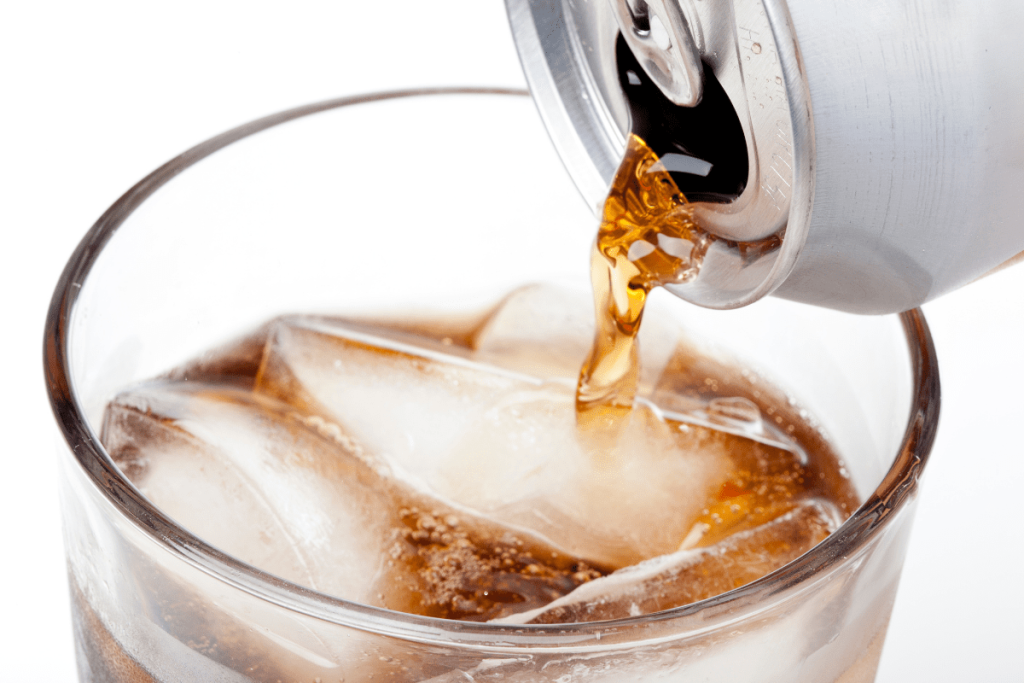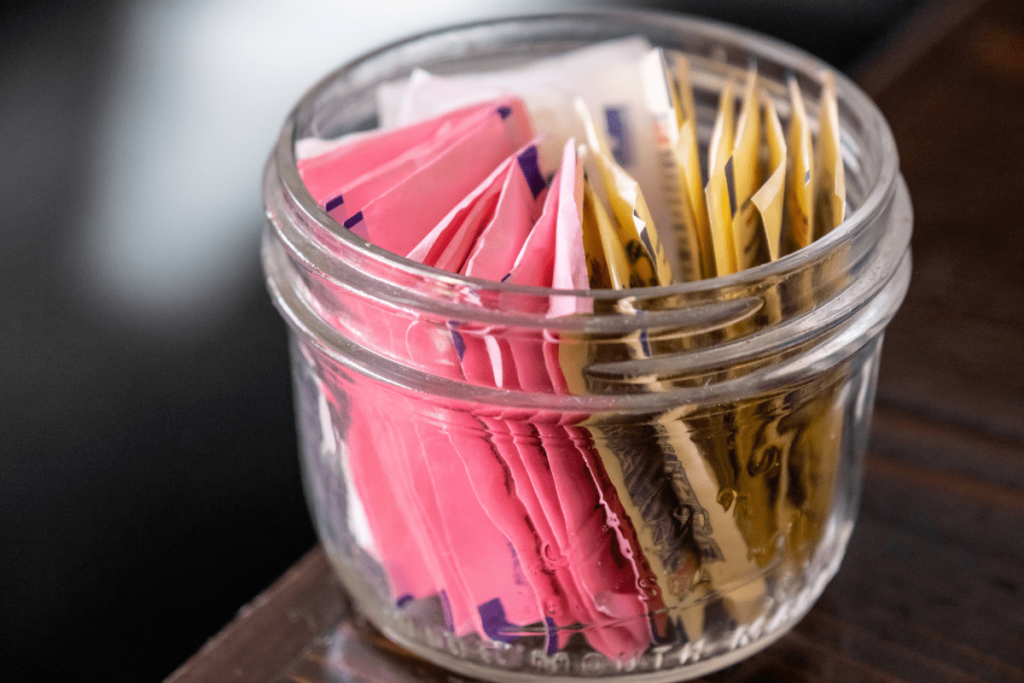The Downside to Diet Sodas

The link between soda drinking and obesity is now well established. But what about the diet kind? Two years ago, a study at the University of Texas Health Science Center found that there was a 41% increase in the risk for being overweight for every single can of diet soda a person consumed daily. But how can something with no calories increase the risk for obesity and heart disease? There are several possible ways. One theory is that the sweet taste works in the brain to create a conditioned response, and the body responds as it usually does to normal sugar with insulin, the fat storing hormone. Those circuits in the brain are pretty primitive as far as your brain is concerned, sweet means sugar. It’s entirely possible that physiologically, you would respond to aspartame in the same way as you would to table sugar. It’s only a theory, but it makes sense. Second, sweetness creates its own cravings. Just as a taste of rum creates an unstoppable craving in an alcoholic, it’s entirely possible that the taste of sweet even if it’s fake creates the same cascade of cravings in a carb addict that regular sugar does, leading to overeating and binging and all the rest of the reasons people put on weight. Third, many people think that by drinking diet beverages they’re “saving” calories and they subconsciously allow themselves to eat more, figuring it’s not doing as much harm because overall their meal has less calories since they’re drinking a diet drink. The diet drink gives them subconscious “permission” to eat more. This isn’t conscious, but it’s totally real. Then there’s the heart disease connection. Aspartame is primarily made from three ingredients aspartic acid, phenylalanine and methanol. Methanol an alcohol ”breaks down in the body to formaldehyde, a poison if there ever was one. Exposing children to formaldehyde levels as low as .75 mg daily for several months has been shown to cause gradual toxicity. Plus, diet soda is frequently stored in hot warehouses, causing even more breakdown that went undetected in the original studies that looked at “ideal” conditions. I don’t know about you, but I don’t need a double blind randomized controlled study to prove to me that water puts out fire. Soda is bad news, whether regular or diet. Period. With diet soda as with sugar less is more and none is better. If you’re going to use sweetener, I suggest you try Xylitol. It actually tastes like sugar, can be used for cooking and baking, has some health benefits (like preventing bacterial adhesion which is why it’s so good in chewing gums) and as a sugar alcohol, has a very low glycemic load. Meanwhile, forget about the diet Cokes. They don’t help you lose weight and they may be contributing to a host of other problems you don’t want or need. Source: Dr. Jonny Brown http://www.jonnybowden.com/2007_09_01_archive.html
Artificial Sweeteners & Weight Gain

Foods and beverages that contain no-calorie artificial sweeteners may be ruining your ability to control your food intake and body weight, according to new research by psychologists at Purdue University’s Ingestive Behavior Research Center. In their study, when compared with rats that ate yogurt sweetened with glucose (a simple sugar), rats that ate yogurt sweetened with the zero-calorie artificial sweetener saccharin: Consumed more calories (and didn’t make up for it by cutting back later) Gained more weight Put on more body fat It’s thought that consuming artificial sweeteners breaks the connection between a sweet sensation and a high-calorie food, thereby changing your body’s ability to regulate intake. The researchers also measured the rats core body temperatures, which typically rise after eating. However, after eating a sweet, high-calorie meal, rats that ate saccharin had a lower rise in body temperature than rats that ate glucose. The researchers believe that this blunted biological response led the rats to overeat, and made it harder to burn off the calories later. They concluded that consuming foods sweetened with saccharin would lead to greater weight gain and body fat than eating the same foods sweetened with sugar. Although further research needs to be done, the researchers believe that consuming other artificial sweeteners such as aspartame, sucralose, and acesulfame K would have similar effects. The evidence just keeps pouring in that consuming artificial sweeteners will likely wreak havoc on your body by impairing your ability to regulate your appetite naturally. Just take a look at last week’s article that found drinking diet soda increases your risk of metabolic syndrome and, ultimately, heart disease. Folks, the belief that eating artificially sweetened foods and drinking artificially sweetened beverages will help you to lose weight is a carefully orchestrated deception. So if you are still opting for diet choices for this reason, you are being sorely misled. In reality, these diet foods and drinks ruin your body’s ability to count calories, thus boosting your inclination to overindulge. Unfortunately, most public health agencies and nutritionists in the United States recommend these toxic artificial sweeteners as an acceptable alternative to sugar, which is at best confusing and at worst harming the health of those who take their misguided advice. Consider what the research says: Diet sodas may double your risk of obesity Artificial sweeteners can stimulate your appetite, increase carbohydrate cravings, and stimulate fat storage and weight gain Yet, gaining weight is only one of the side effects of consuming these man-made chemical sweeteners. There is enough evidence showing the dangers of consuming artificial sweeteners to fill an entire book — which is exactly why Dr. Mercola wrote Sweet Deception. If you or your loved ones drink diet beverages or eat diet foods, this book will explain how you’ve been deceived about the truth behind artificial sweeteners like aspartame and sucralose — for greed, for profits … and at the expense of your own health. What’s wrong with those tiny pink, blue and yellow packets? Well, take aspartame for instance. The phenylalanine in aspartame dissociates from the ester bond and increases dopamine levels in your brain. This can lead to symptoms of depression because it distorts your serotonin/dopamine balance. It can also lead to migraine headaches and brain tumors through a similar mechanism. Furthermore, the aspartic acid in aspartame is a well-documented excitotoxin. Excitotoxins are usually amino acids, such as glutamate and aspartate. These special amino acids cause particular brain cells to become excessively excited, to the point they will quickly die. Excitotoxins can also cause a loss of brain synapses and connecting fibers. Then the ester bond in aspartame is broken down to formaldehyde and methanol, which have their own toxicities. So it is not surprising that this popular artificial sweetener has also been found to cause cancer. So aside from causing you to gain weight, artificial sweeteners may cause all sorts of nasty side effects to your health. Source: Dr. Mercola http://articles.mercola.com/sites/articles/archive/2008/2/26/artificial-sweeteners-once-again-linked-to-weight-gain.aspx
The Health Effects of Artificial Sweeteners

Artificial sweeteners, also called sugar substitutes, are substances that are used instead of sucrose (table sugar) to sweeten foods and beverages. Artificial sweeteners are regulated by the U.S. Food and Drug Administration (FDA). The Food Additives Amendment to the Food, Drug, and Cosmetic Act, which was passed by Congress in 1958, requires the FDA to approve food additives, including artificial sweeteners, before they can be made available for sale in the United States. Currently, five artificial sweeteners are approved by the FDA: Aspartame, sold under the brand names NutraSweet® and Equal® Saccharin, sold under the brand name Sweet N Low® Sucralose, sold under the brand name Splenda® Acesulfame K (or acesulfame potassium), produced by Hoechst, a German chemical company; widely used in foods, beverages and pharmaceutical products around the world Neotame, produced by the NutraSweet Company; the most recent addition to FDA’s list of approved artificial sweeteners, neotame is used in diet soft drinks and low-calorie foods According to the National Cancer Institute, there is no clear evidence that artificial sweeteners on the market in the United States are related to cancer risk in humans. However, numerous studies performed on laboratory rats link aspartame and saccharin to cancer, including a recent seven-year study conducted by a major nonprofit oncology lab in Italy.² The Center for Science in the Public Interest (CSPI), on the other hand, cautions everyone to avoid aspartame, saccharin and acesulfame K, because they are unsafe in amounts consumed or are very poorly tested and not worth the risk. The CSPI lists neotame and sucralose as safe. Aspartame is of particular concern because it contains phenylalanine (50%), aspartic acid (40%), and methanol (10%), three well-recognized neurotoxins. The following symptoms have been associated with the consumption of aspartame:³ headaches nausea dizziness hearing loss tinnitus insomnia blurred vision eye problems hallucinations memory loss slurred speech mild to suicidal depression personality changes violent episodes mood changes anxiety attacks hyperactivity heart arrhythmia edema or swelling gastrointestinal disorders seizures skin lesions muscle cramps joint pains fatigue PMS menstrual irregularities chest pain increased appetite numbness and tingling of extremities Fortunately, most of the above symptoms are alleviated once aspartame use is discontinued. Cyclamate, an artificial sweetener that is popular outside of the U.S., is not FDA-approved. See owdown on Sweet?, published in The New York Times on February 12, 2006. FromAspartame: The Real Story, by Annemarie Colbin.
